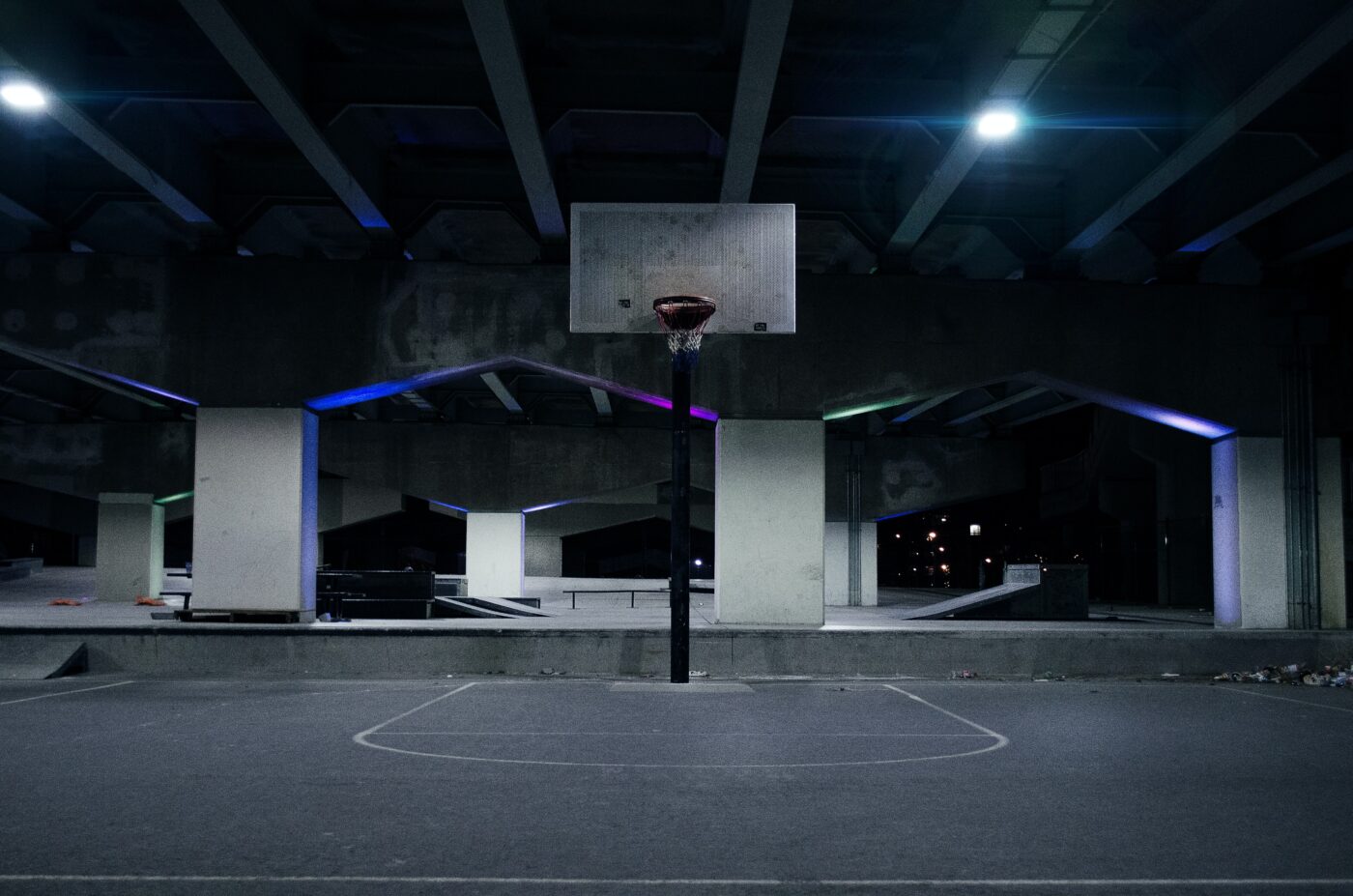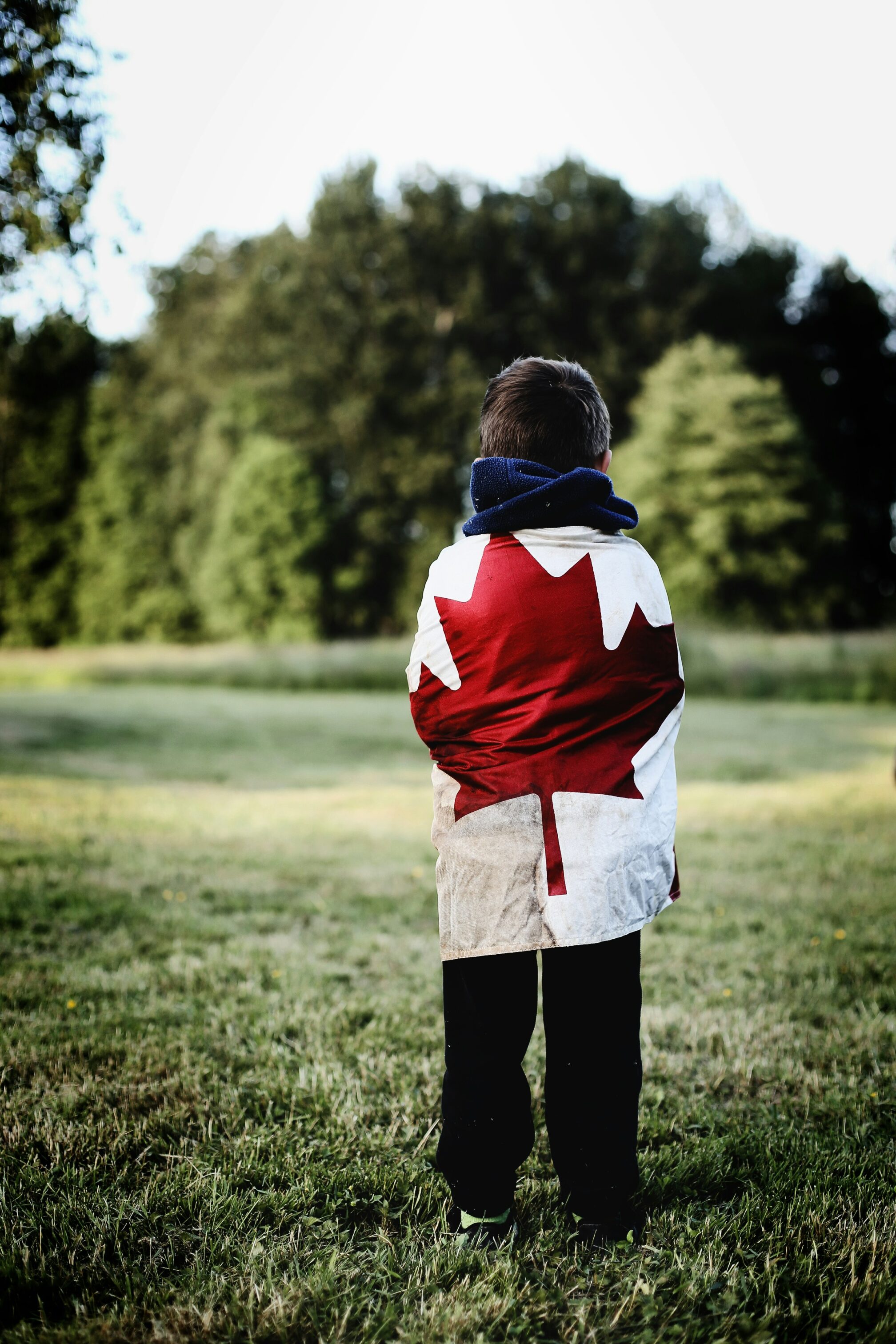PART 1
fighting for room: women in toronto's basketball scene
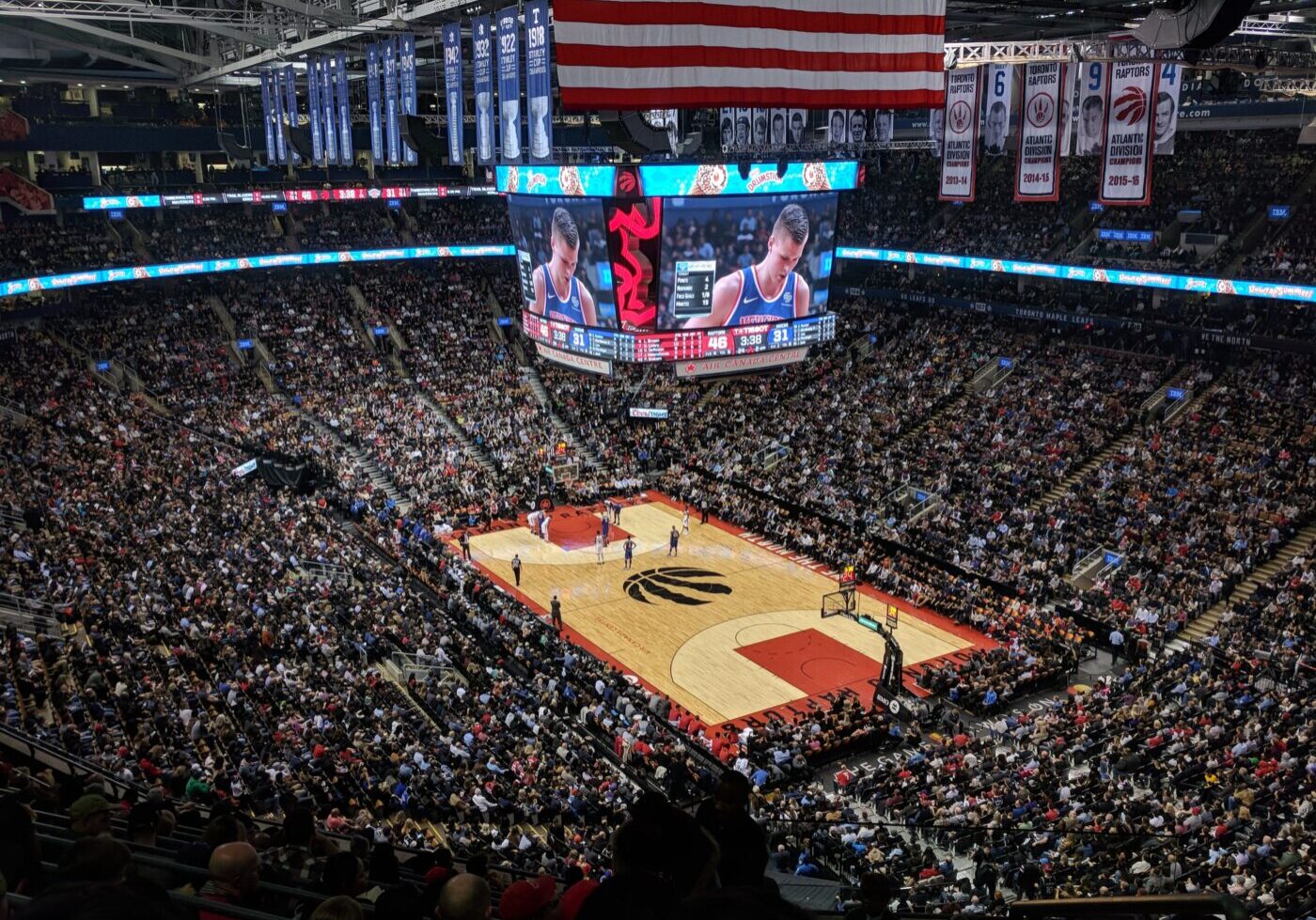
fans gather to watch the toronto raptors on game day.
📸: ryan mchugh via unsplash

SHAKI SUTHARSAN
Toronto native and Tamil-Canadian who's currently studying journalism and public relations at Toronto Metropolitan University. Writer and avid consumer of fiction. Boyband loyalist.
August 1, 2022
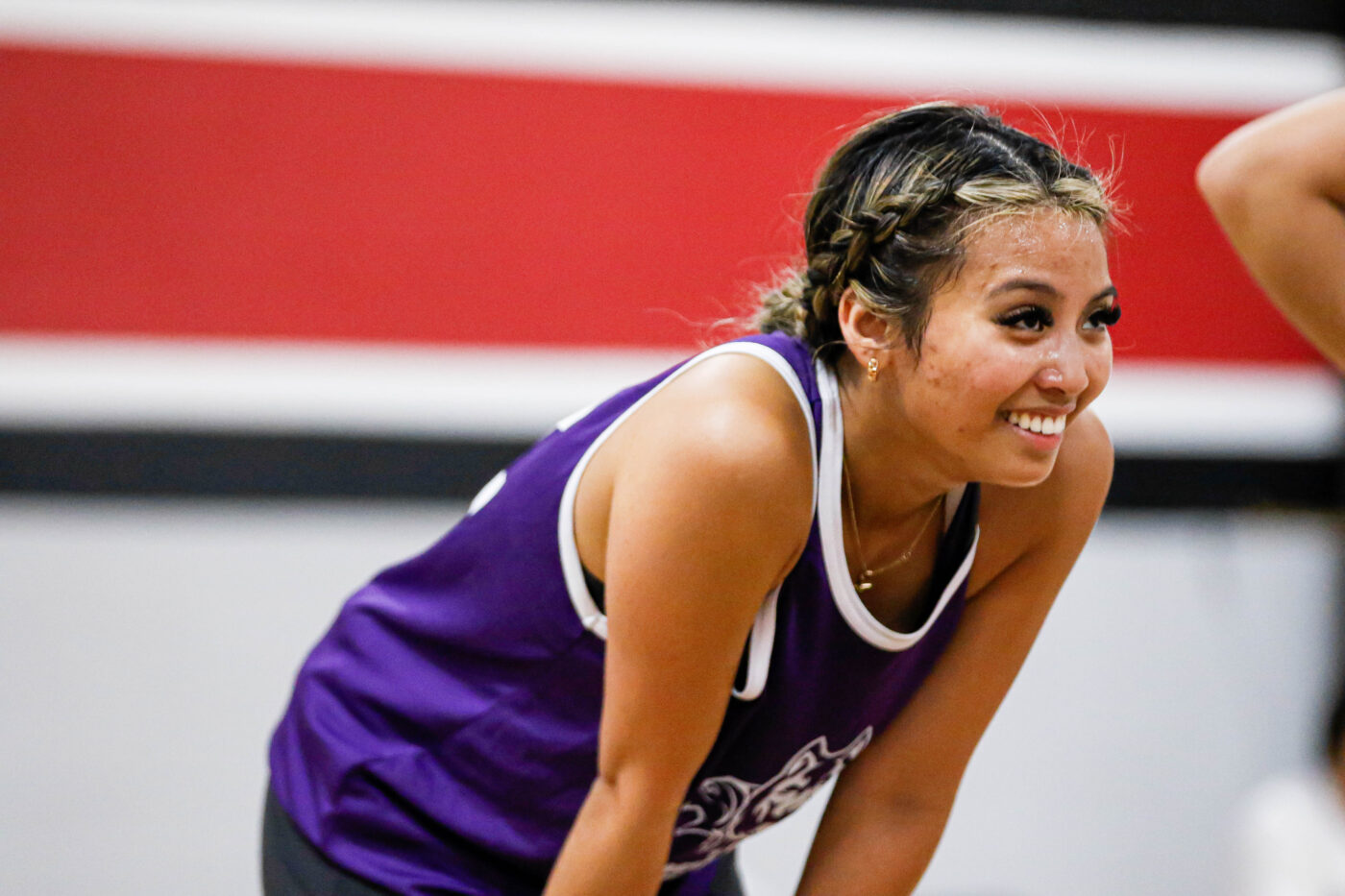
Ashley Mauhay flashes a big smile as she lines up at the free-throw line.

Lisa Wiele, director of partnerships and engagement at MLSE Launchpad, says a lack of sports infrastructure is the key issue.
"With limited infrastructure and limited places to play, there’s going to be a lack of opportunity....in terms of who’s getting access to those spaces," Wiele says.
Bess Lennox, manager of sport programming at MLSE Launchpad, adds that there's been a "slower return to play for girls" in particular.
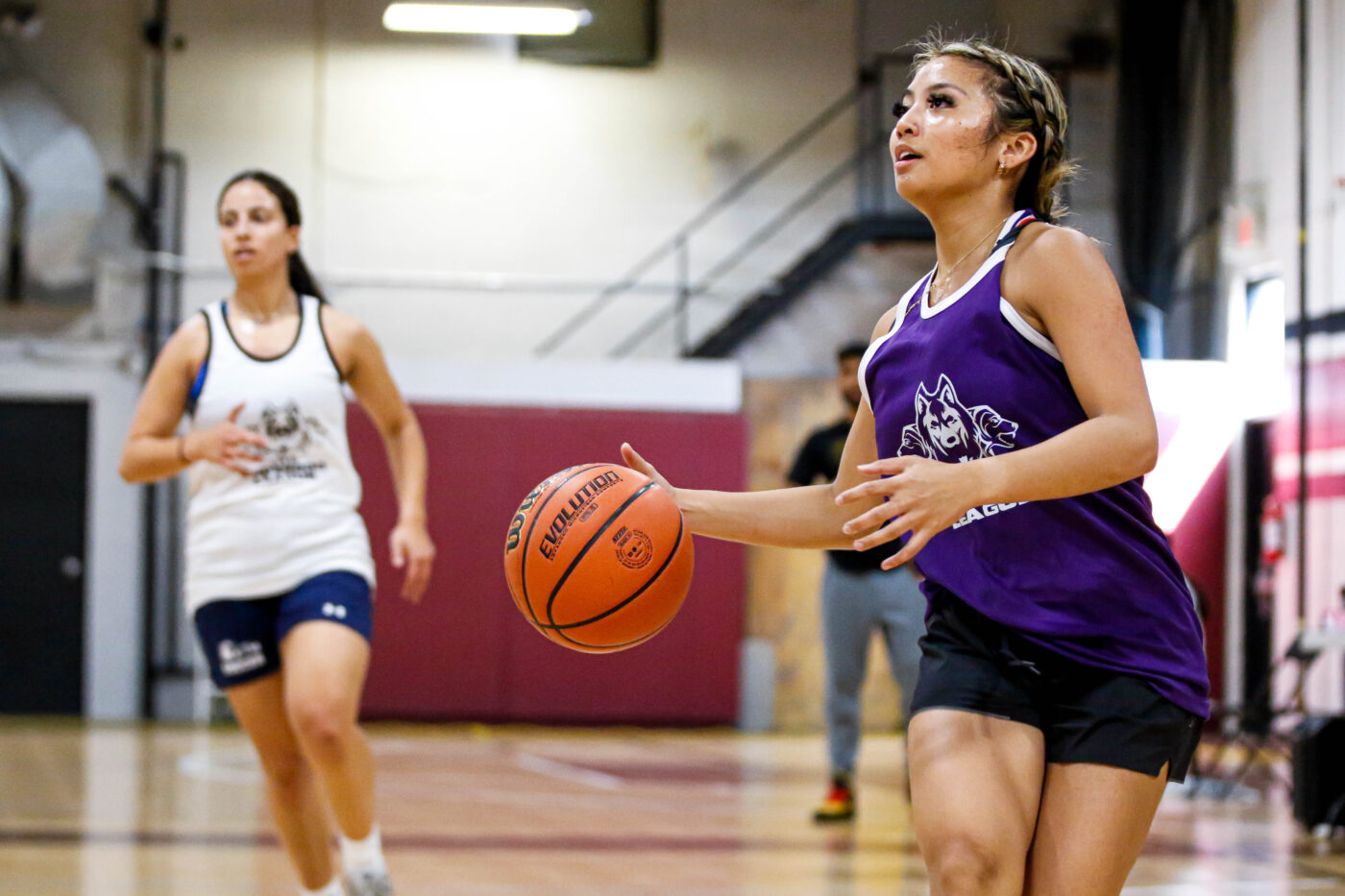
Ashley Mauhay catches the ball and pauses briefly before attempting a three-pointer.

According to the MLSE Foundation's Change the Game research project in 2021, 60 per cent of girls and young women who play basketball in Ontario cited the need for more accessible indoor spaces to play.
This is a barrier that women from low-income households are more likely to cite, the report continues.
"Not only [are] people struggling to get back into recreational spaces, but the time isn’t dedicated for girls-only spaces when they’re in there," Lennox says.
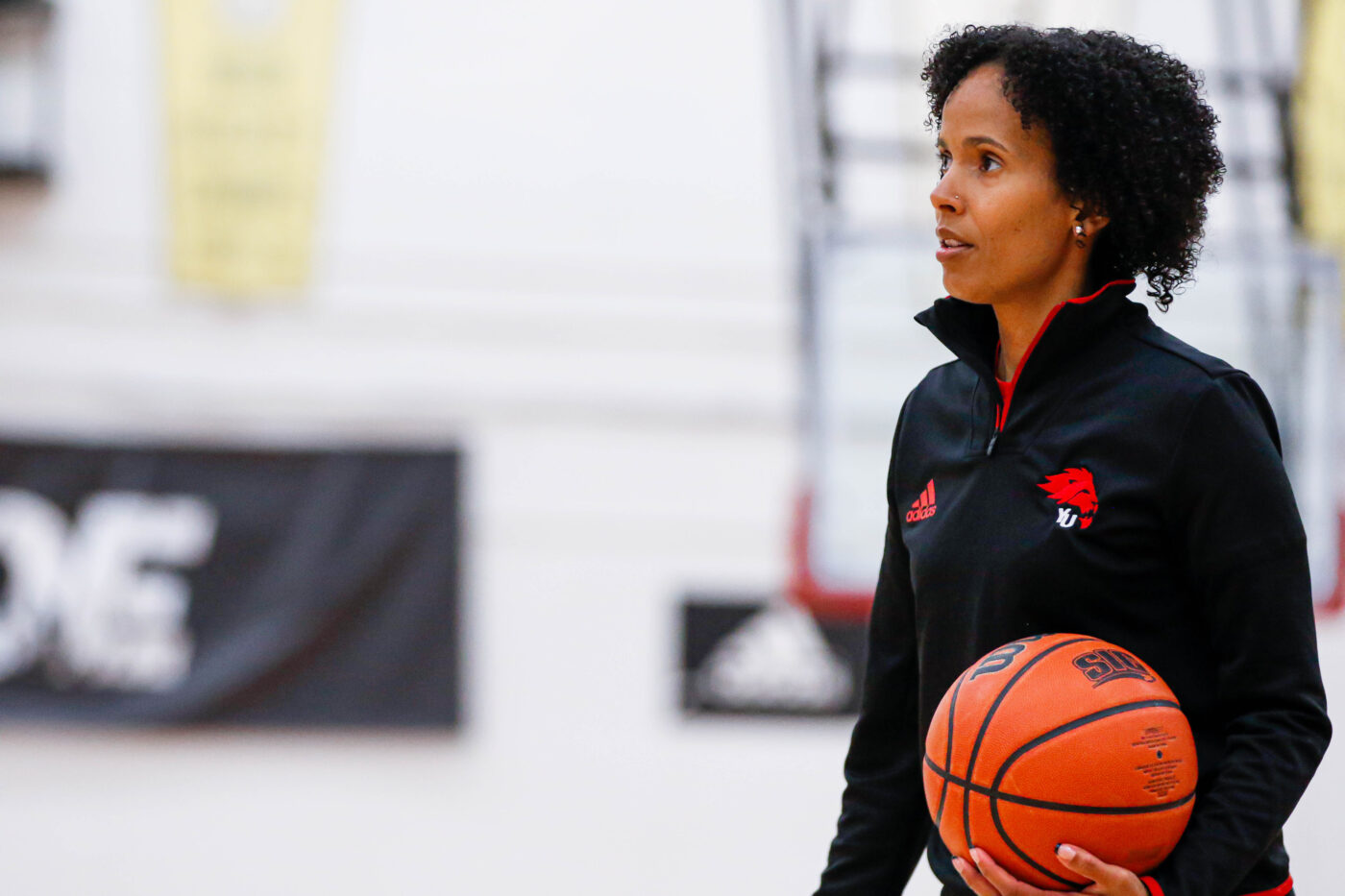
Christa Eniojukan collects a loose ball while glancing at the scoreboard.

She adds that women from underrepresented communities are hit hardest by this lack of sports infrastructure.
"I could access what we might call a co-ed space to play sport...and that increases my opportunities. But Muslim women do not have the same options," Lennox explains, describing cultural barriers that need to be considered in order to create spaces that all girls and women in Toronto can access.
Along with potential cultural barriers, Wiele says some women face financial and transportation barriers when playing sports due to limited accessibility.
"We have young women who come to Launchpad — you know, single-parent household, they’re traveling across the city, maybe out to Oshawa, Pickering, wherever — three, four nights a week to play," she explains. "That’s not only financially expensive, it’s very challenging to manage."
"Not only [are] people struggling to get back into recreational spaces, but the time isn’t dedicated for girls-only spaces when they’re in there."
BESS LENNOX, MLSE LAUNCHPAD'S MANAGER OF SPORT PROGRAMMING
With 47 per cent of the Raptors' fanbase comprised of women and 41 per cent of those women self-identifying as "diehard" fans, their interest in the sport is clear.
Christa Eniojukan, head coach of York University's women's basketball team, says it's "heartbreaking" that so many girls don't have access to the same sporting opportunities as boys, despite their interest and talent.
"There were more barriers for [women]," she says.
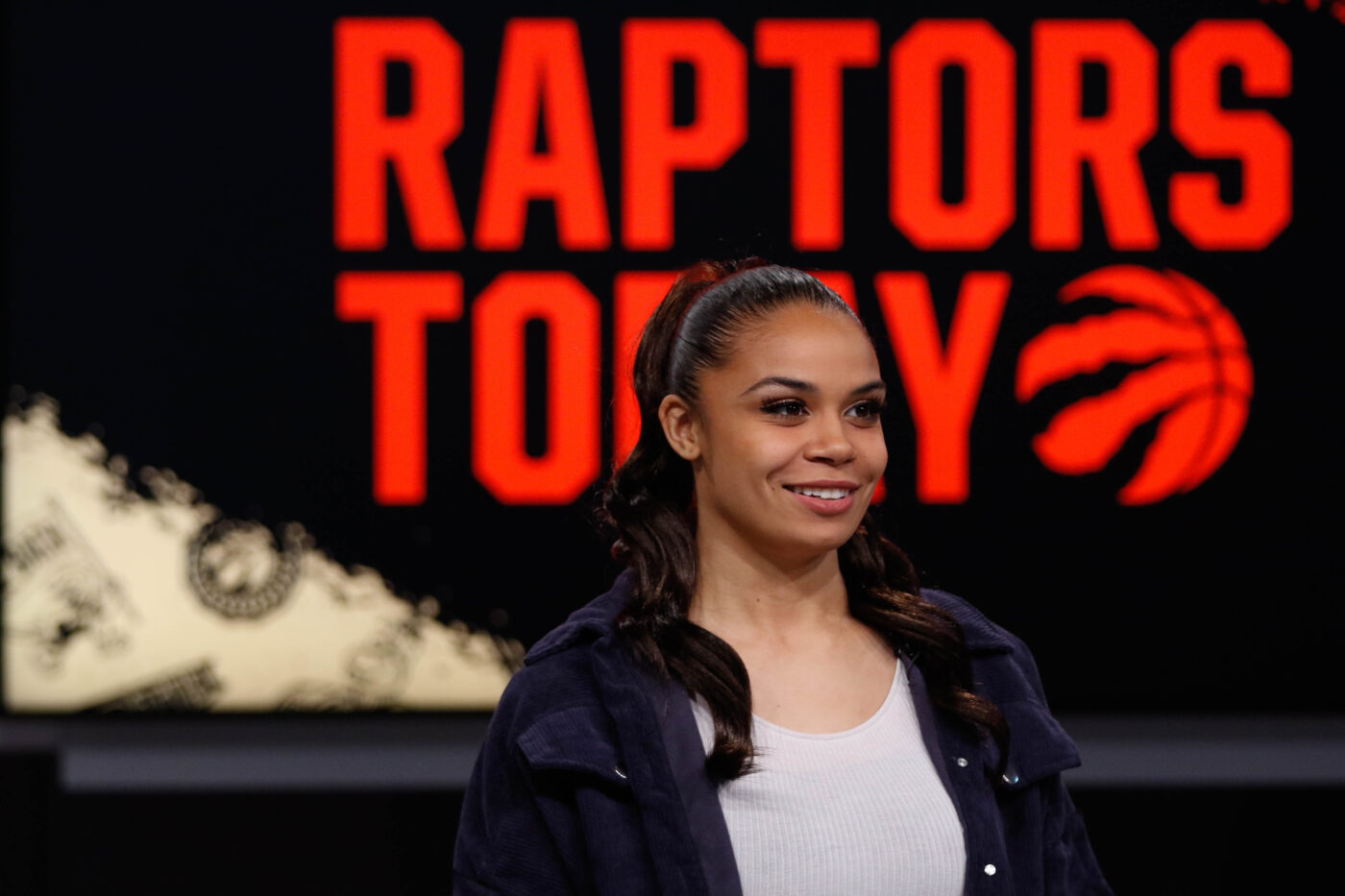
Savanna Hamilton smiles at her producer on the set of Raptors Today.

Savanna Hamilton, host of NBA TV Canada's flagship show Raptors Today for MLSE (Maple Leaf Sports & Entertainment), says there's a lack of women — especially racialized women — in leadership roles within the industry, including sports media.
"Many times, I am still the only Black female in the room," she says. Hamilton is only the second Black woman to have her own show in sports media in Canada.
Lennox echoes the importance of having women in front-facing roles in sports, citing WNBA player Kia Nurse and Kayla Grey, the first Black woman to have her own sports media show in Canada, as examples. She believes representation encourages girls to pursue sports careers, which helps in developing a supportive ecosystem for women athletes.
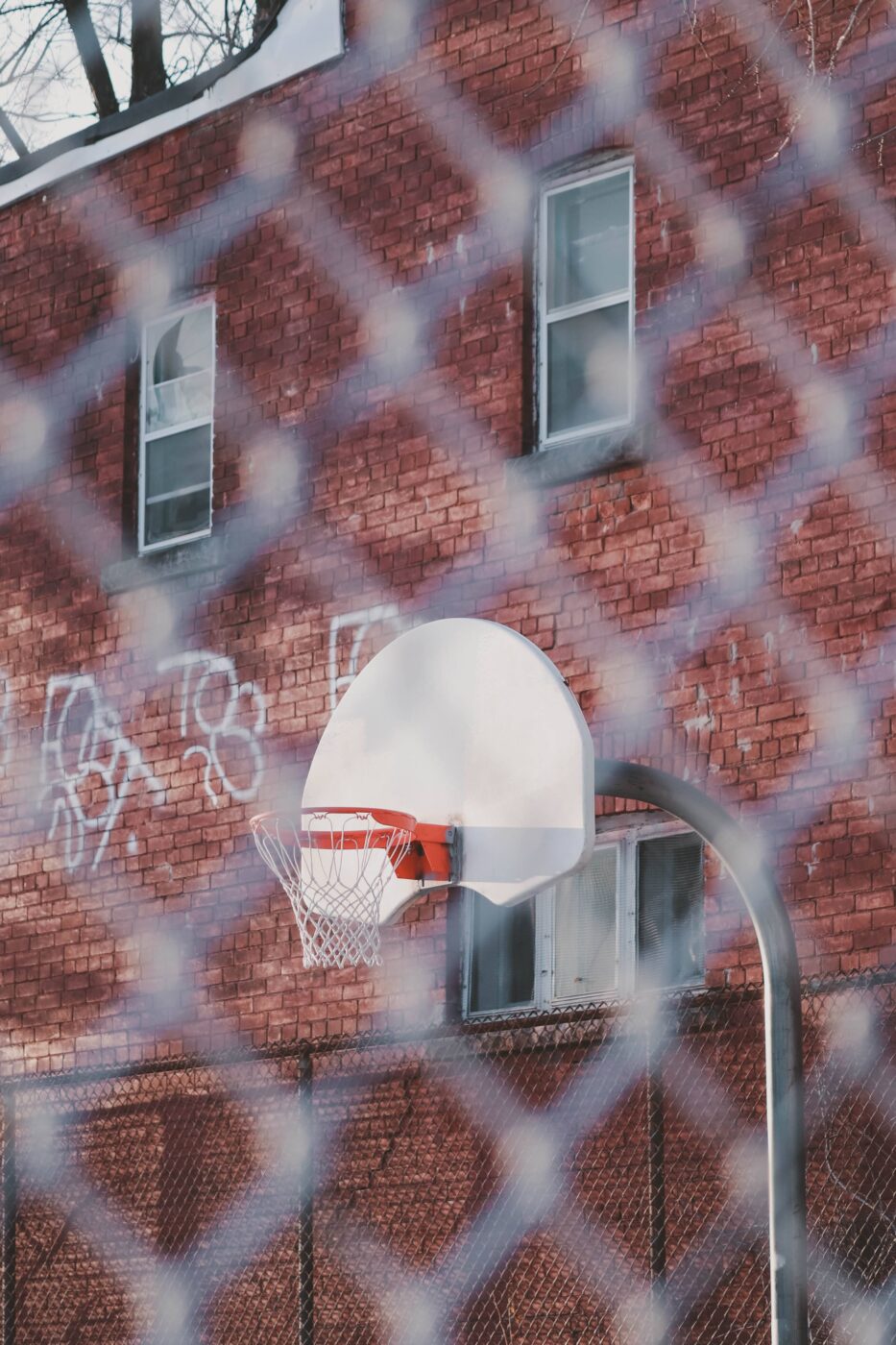
Basketball net in Toronto.

After reading this explainer, head over to TheGreenLine.TO to check out our feature on making space for women in Toronto's basketball scene. Then register for our 5x5 basketball competition and community event!
Tell us: Where do you like to play basketball in the city?
Today’s stories lead to tomorrow’s solutions, so sign up for our newsletter to take action on the issues you learn about in The Green Line.
PART 2
Jumping Through Hoops:
How Women of Colour are Making Space in Toronto's B-Ball Culture
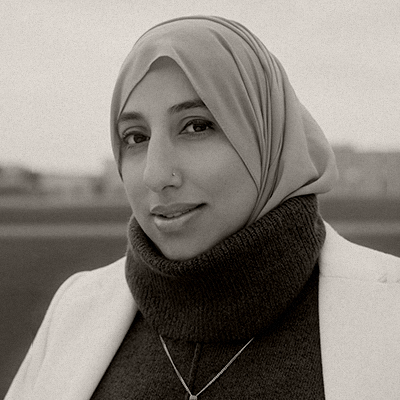
SHIREEN AHMED
Multiplatform sports journalist. Instructor at Toronto Metropolitan University. Loves sports, but doesn't love the systems of oppression that surround them. Proud resident of Mississauga. Adores cats. Drinks coffee as a tool of resistance.
August 8, 2022
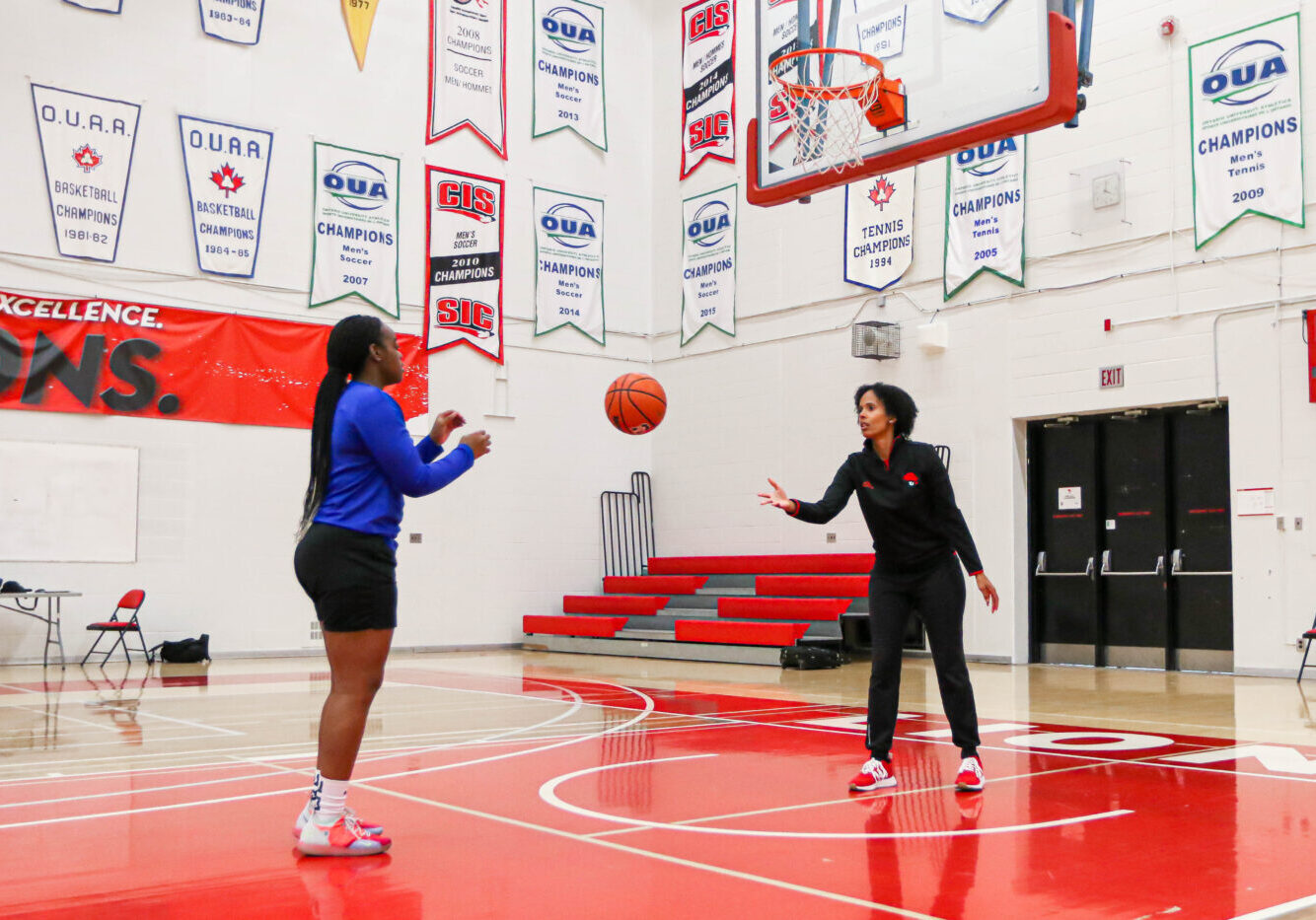
Christa Eniojukan retrieves a ball for one of her summer athletes.

It’s 2014 and our Toronto Raptors just clinched a place in the playoffs, kicking off the city’s “We the North” era.
On this particular evening, DeMar DeRozan and the G.R.O.A.T — Greatest Raptor of All Time — Kyle Lowry would battle Paul Pierce and Kevin Garnett of the Brooklyn Nets in game four of the Eastern Conference first round.
That evening, April 27, was also the first time I realized how integral women of colour are to Toronto’s basketball culture. I was attending a family wedding event held at a banquet hall in Mississauga. The traditional henna party, or mehndi, started hours late.
To prepare for this expected delay, my then-husband brought along our flat-screen television and all the requisite cables from home to the banquet hall. We were determined to watch the Raptors face the Nets. At the insistence of our hosts, we arrived early to an empty hall, set up the stream on our TV and settled in with our brood to watch the 7 p.m. tip-off.
For me, the evening’s most exciting moment wasn’t when the Raptors won that game (they would fight hard, but lose the nail-biting series in a seven-game stretch). It was when one of the aunties in attendance, Zeenat Saeedi, caught wind of what we’d set up. After meeting the social requirements of polite Pakistani etiquette, she dragged a chair from the bustling ballroom where Bollywood music was playing loudly and guests were chatting, into the foyer where my family and I were watching the game. Zeenat Auntie, who kept whipping her elaborately embroidered chiffon stole, or dupatta, over her shoulder, was elated.
“Shireen, beti, thank you!” she whispered, using the Urdu word for daughter. “I didn’t want to miss this game!”
As more guests arrived, some looked at our Raptors setup with confusion. But Zeenat Auntie sat, unapologetically cheering and clapping. She only stepped away from the TV to greet the bride and her family. After the game ended, Zeenat Auntie readjusted her dupatta ever so carefully, and joined other aunties in conversation without missing a beat. I hadn’t pegged her for a basketball fan — cricket, maybe. But since that moment, I’ve never forgotten Zeenat Auntie’s passion because her fandom — like that of many other women of colour in this city — form one of the pillars of basketball culture in Toronto.
Based on polls, internal data and surveys collected over the past year, the Toronto Raptors know that women make up 47 per cent of their entire fanbase. Of the fans surveyed, women comprise 41 per cent of those who identified as “diehard” and 52 per cent of those who identified as “casual,” according to Jennifer Quinn, the Raptors’ director of communications.
But that interest isn’t necessarily translating to more opportunities for girls and women to play basketball or other sports in Toronto. Preliminary findings from the Maple Leaf Sports and Entertainment (MLSE) Foundation's 2022 “Change the Game” research project reported that 53 per cent of young women aged 19 to 29 years old couldn’t afford to play sports. Lack of access to appropriate equipment and a limited variety of sports offered in their community are big barriers for women, especially those of colour.
Affordability and social factors have a lot of weight when it comes to girls and young women deciding whether or not to pursue a sporting opportunity. In fact, the project found that they’re more likely than boys and young men to cite accessible spaces, affordability, having peers and friends they can play with, and having teammates that accept who they are, as important to them. Girls and young women who identified as Black, South Asian or Southeast Asian especially emphasized these factors as important to their participation.
That's why women leaders across the basketball industry in Toronto are trying to carve out more physical and cultural space for hoops enthusiasts like them. They’re shaping the future — and changing the face — of Canada’s fastest-growing sport.
Players gonna play
In 2009, Ashley Mauhay moved from the Philippines to Canada, where she started her budding basketball career at 8 years old.
It began in a safe and familiar place — the Mabuhay Cup (MCup) Invitational Basketball Tournament, a Mississauga-based Filipino league in the North American Basketball Association based out of the Hoopdome in Downsview Park.
“She was very girly at that time,” her mom Andrea Mauhay, who also played basketball recreationally in the Philippines, says with a laugh. “She was terrible at that time.”
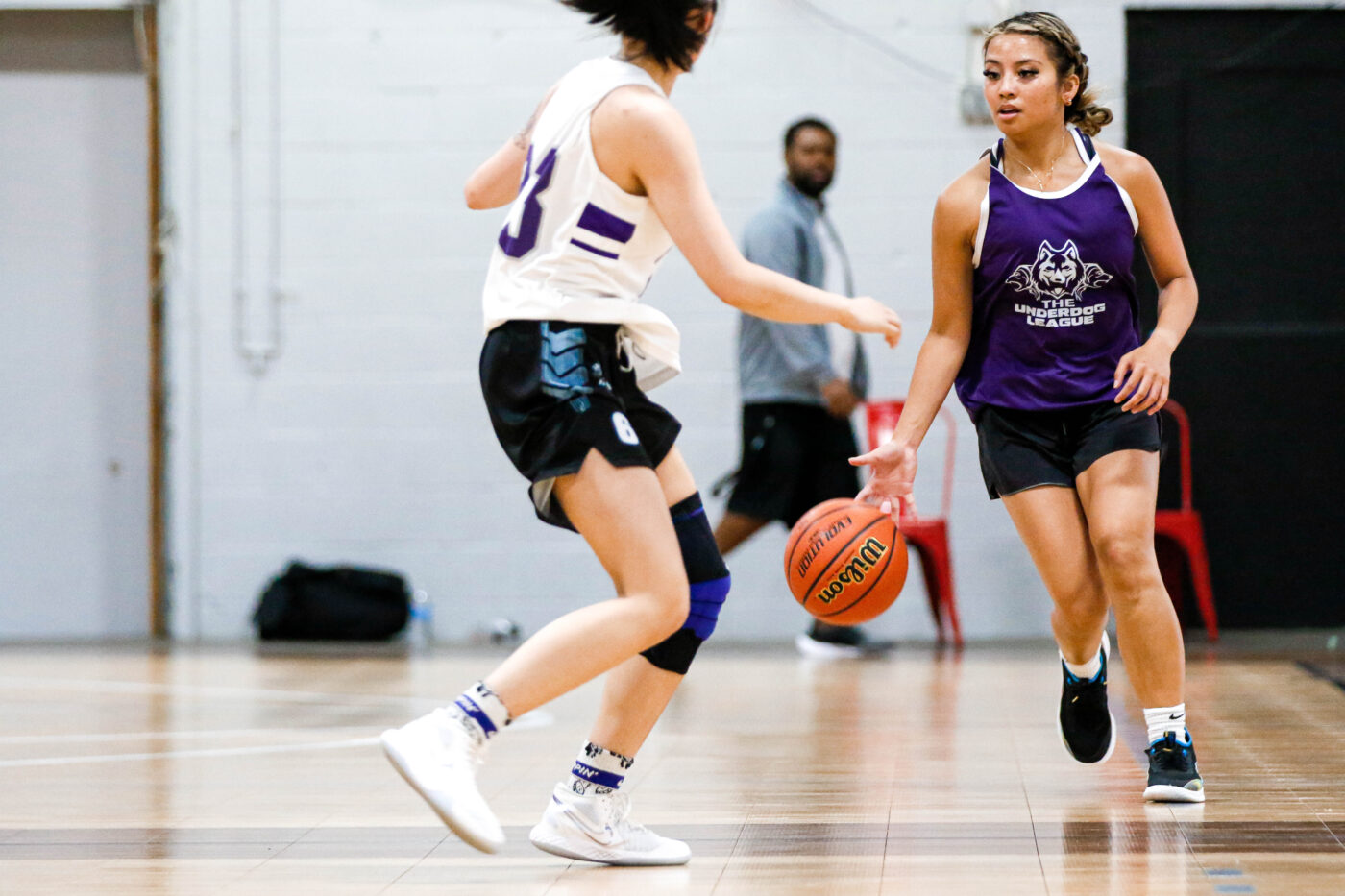
Ashley Mauhay brings the ball up the court.

Although her daughter mostly played with boys and only ever had one other teammate who was a girl, Andrea wasn’t concerned. “Everyone goes out and gets along, and it never dawned on me that, ‘Hey! She is a girl and couldn’t play.’”
Eventually, Ashley mastered her defensive skills while playing on boys' teams in the MCup and the Mississauga Knights, a youth basketball program she joined at 8 years old. As a student at St. Clare Elementary School in Mississauga, Ashley began to attract attention for her skills. “She got [the] most important player [award],” Andrea recalls, describing her daughter as tough, motivated and serious about the sport.
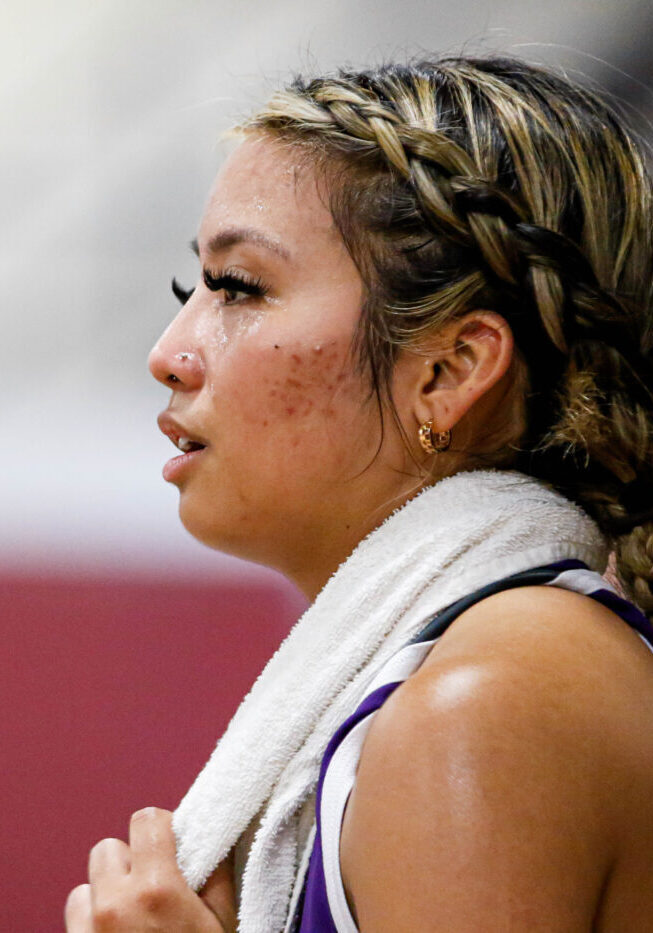
Ashley Mauhay wraps a towel around her neck, as she catches her breath during a timeout

After a successful high school career, Ashley, now 19, began studying concurrent education at Laurentian University where she was a shooting guard on the varsity women’s basketball team (she’s since left Laurentian and is currently at Trent University). Ashley played in various leagues over the years, but the MCup still holds a special place in her heart.
“The community continues to support me,” she says, but adds that “they need to come to games and support the teams [beyond social media].” Now that there aren’t any COVID-19 mandates and gyms are allowing spectators again, Ashley wants to see them as full as they are when men’s teams play.
Even at a grassroots level, Andrea says their community helped Ashley in her playing career. Indeed, the Mauhays knew many of the local players and their families who often brought potluck-style food to tournaments to share.
“It’s a Filipino thing. Personally, I don’t really care about basketball, but Filipinos love basketball,” Andrea explains. “Friends, friends of friends, you know? She watched from the sidelines and then wanted to play.”
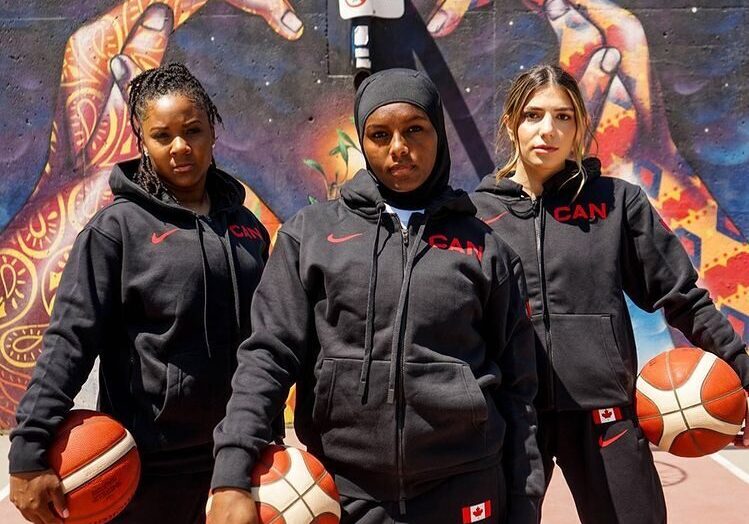
Fitriya Mohamed (centre) standing next to her fellow basketball players.

MAKING CULTURAL SPACE
As one of the highest-profile Muslim women in basketball, Fitriya Mohamed has been the face of several campaigns for Canada basketball and Nike Toronto.
She’s also a member of Hijabi Ballers, a local organization that inspired the Raptors to partner with Nike to create the world’s first sports hijab with an official NBA logo.
The now 26-year-old knew she wanted to play basketball as a kid, but unlike Andrea Mauhay, her mother wasn’t initially on board; she didn’t understand Mohamed’s desire because there wasn’t a strong tradition of girls playing basketball in their native Ethiopia. She often fretted over Mohamed’s game-day travels to BGC St. Alban's Club near Bathurst and Dupont Streets from their home at Weston Road and Jane Street.
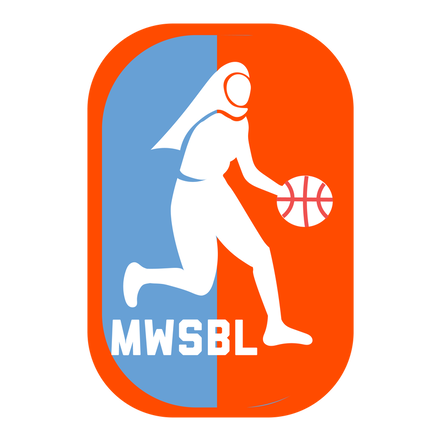
The Muslim Women’s Summer Basketball League (MWSBL) logo.

This lack of accessible sports leagues in her neighbourhood compelled Mohamed to create opportunities for other young women to play. She promised herself she’d start a league that had the needs of Muslim women in mind by addressing financial constraints, uniform accommodations and cultural considerations.
So one year after graduating in 2019 with a sport management degree from Brock University, Mohamed launched the Muslim Women’s Summer Basketball League (MWSBL), which allows players to wear hijabs and loose clothing. It also plans to hire women for coaching and referee positions. And thanks to the Toronto and Region Islamic Congregation (TARIC), which sponsors the league, the MWSBL can provide a women-only space to play.
“We shouldn’t be having a conversation about hijab [in sports] that will lead to Muslim women feeling discouraged, feeling unwelcome in that sporting arena,” Mohamed says.
Similarly, due to a lack of encouragement early on, Mohamed didn’t immerse herself in sports until grade nine when her school’s basketball coach Greg Brohman invited her to tryouts. Now, Mohamed is networking and organizing tournaments across North America to ensure that when she’s an auntie, she’ll have the connections and resources to support other young women like her. Mohamed feels strongly that they shouldn’t have to contort themselves to be included in Toronto’s basketball culture, or to fit a dated archetype of what a hooper is “supposed” to look like.
“I remember how that felt — not having a space or being trusted or being supported with my sporting career,” she explains. “If [MWSBL] could create a community that is fully supportive of their basketball journey, why not?”
“That is why I am so committed — because of the lack of opportunities that were there for me when I was younger.”
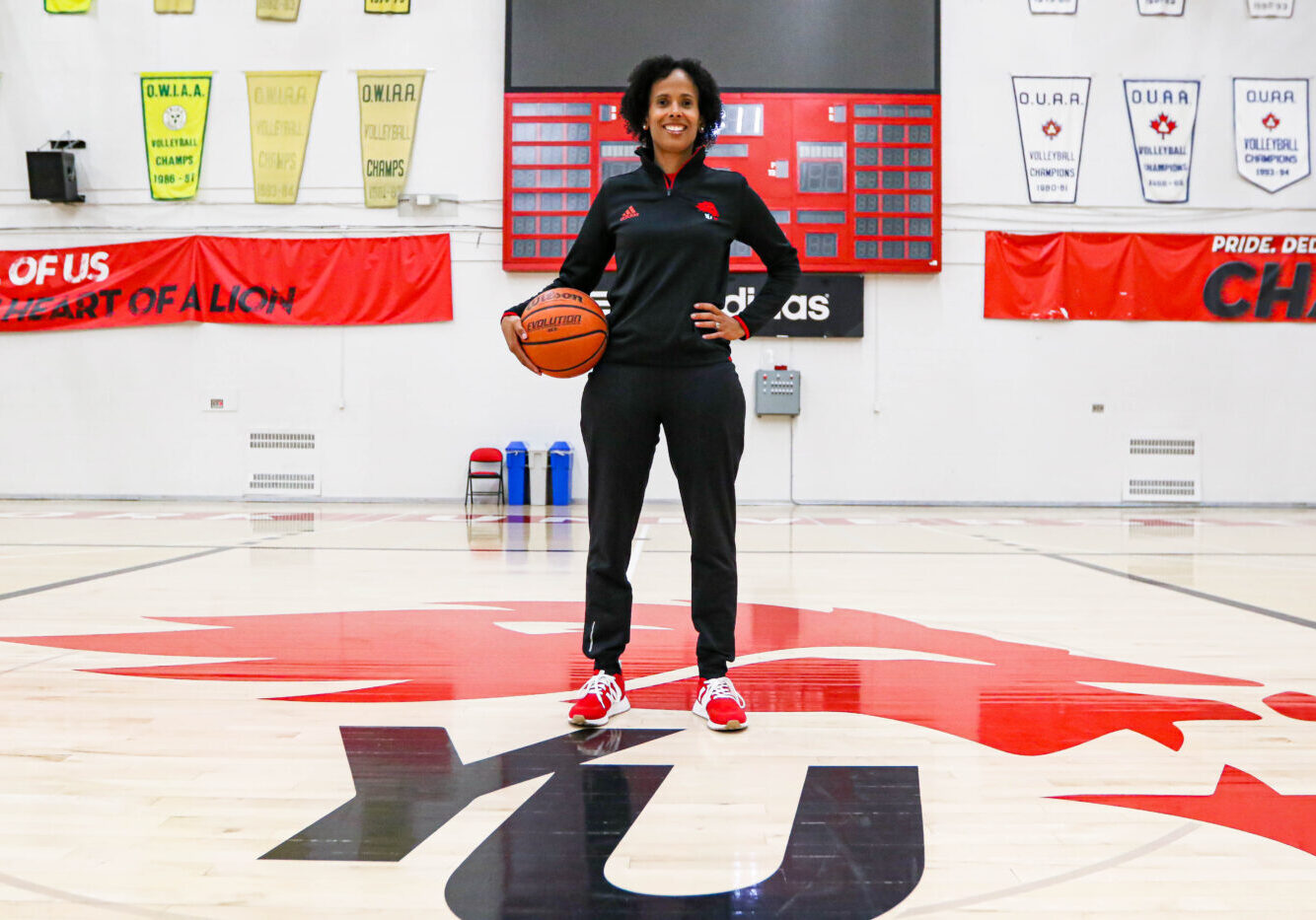
Christa Eniojukan poses at centre court.

KNOCKING 'EM DEAD
Like Mohamed, Christa Eniojukan is also passionate about knocking down barriers for aspiring ball players who aren’t supported from the get-go.
Now head coach of the York University Lions women's basketball team, Eniojukan previously coached, among other places, at “inner-city” Toronto public schools where she took a particular interest in recruiting girls.
The former point guard, who pursued a teaching degree and played basketball at York, sharpened her coaching skills at these schools. At Rockcliffe Middle School near Jane Street and St. Clair Avenue West, Eniojukan worked with another coach to help teen ballers level up their game. Later, at Bliss Carman Senior Public School near Kingston and McCowan Roads, she established basketball programs and would “actively recruit in the hallways."
The talent in these inner-city schools is so high,” Eniojukan says, but adds that “sometimes it’s a little heartbreaking because the boys would be encouraged to play, but not the girls.”
The former Canadian Interuniversity Sports (CIS) player quickly noticed that girls at these schools generally didn’t have the same playing opportunities as boys; one reason was that they were sometimes from traditional-minded families who relied on daughters to care for their siblings. This is where the community played an essential role, Eniojukan explains. Convincing one set of parents of the benefits of basketball had a domino effect because they would then speak to another set of parents, and so on.
Sometimes these parents had safety concerns and didn’t want their daughters to head out too late for practice, especially during the winter when the sun sets earlier. So, Eniojukan addressed their concerns by holding practices during lunchtime instead. Acknowledging a family’s financial or cultural barriers without judgement gave girls at these schools the chance to fall in love with basketball.
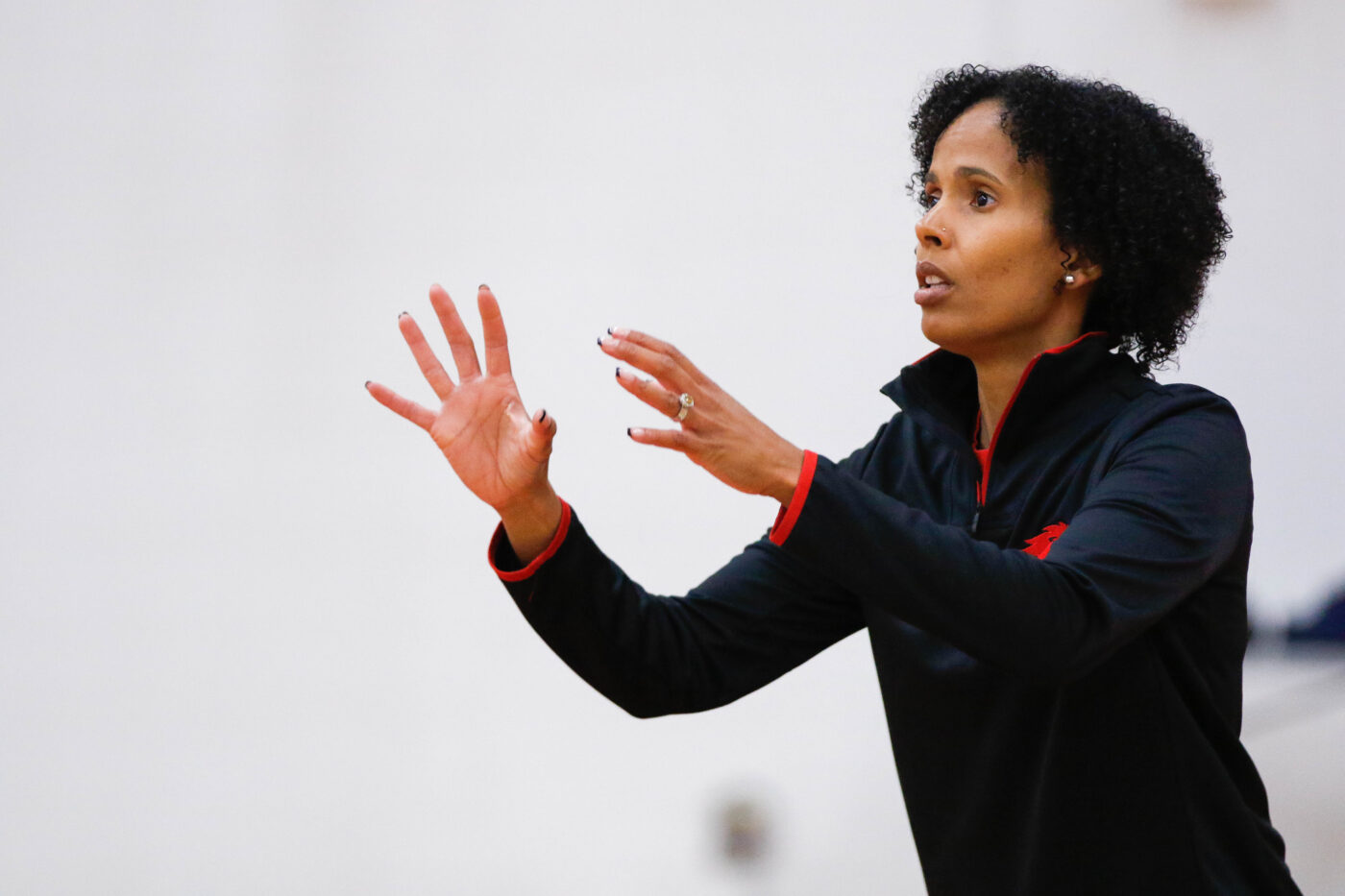
Christa Eniojukan prepares to receive a pass from one of her players.

“There were more barriers for [women],” she says. “But I was very much like: I’m going to find a way.”
Now, Eniojukan feels that fostering psychological safety in basketball culture is essential, and is mindful of the need to build up girls’ basketball programs in Toronto at all levels — from community- and school-based to provincial and national. At the core of her approach to coaching at York is the understanding that “you can’t shine on the court if you don’t have the mental capacity.”
LET'S GET PHYSICAL
But the kind of cultural space that Eniojukan and Mohamed are making isn’t enough to support girls and women in Toronto’s basketball ecosystem.
Physical space is also necessary.
The MLSE Foundation recently partnered with Simon Darnell, associate professor of sport for development and peace at the University of Toronto, to produce its 2022 “Change the Game” research project on play-related access, engagement and equity issues across Ontario in the wake of COVID-19. A total of 8,282 respondents participated in their survey, of which 57 per cent were girls and young women aged 6 to 29 years old.
Of those surveyed, 70 per cent of girls and young women who play basketball cited the need for more indoor space access, while 67 per cent cited the need for more outdoor space access. Among girls and young women who haven’t participated in any sport in the past year, 60 per cent cited the need for more indoor space and 66 per cent cited the need for more outdoor space.
Tanya Callaghan, founder of the local nonprofit Girls Addicted to Basketball (g.a.b), said in an email that girls’ basketball needs to be in far more spaces than it currently occupies in Toronto. “We need all these platforms to come together to offer space for girls in sport — particularly basketball — to flourish,” she explains.
A veteran of the local basketball scene, Callaghan has been expanding g.a.b’s programming since its launch in Eswatini (formerly known as Swaziland) in 2005. In addition to hosting development programs in Scarborough and North York, the nonprofit offers financial support to families who aren’t able to afford g.a.b’s programs through its athlete sponsorship fund; a player can save half the cost of a program if another member donates to the fund.
But nearly two decades after its launch, g.a.b still struggles with space issues in a big city like Toronto where facilities and permits are difficult to come by. Indoor gyms that are accessible to everyone are especially hard to get since you’re competing with many other sports leagues that want to rent out the same space, Callaghan explains.
“Organizations [that] have basketball courts want to make money, so to give up space at a not-for-profit rate versus getting full rates — I mean, we do live in a capitalist society, so we get bumped out,” she says. “Girls’ basketball will continue to grow at a slow rate until the powers that be — those who have the financial resources and who are the decision-makers for sports — invest in women.”
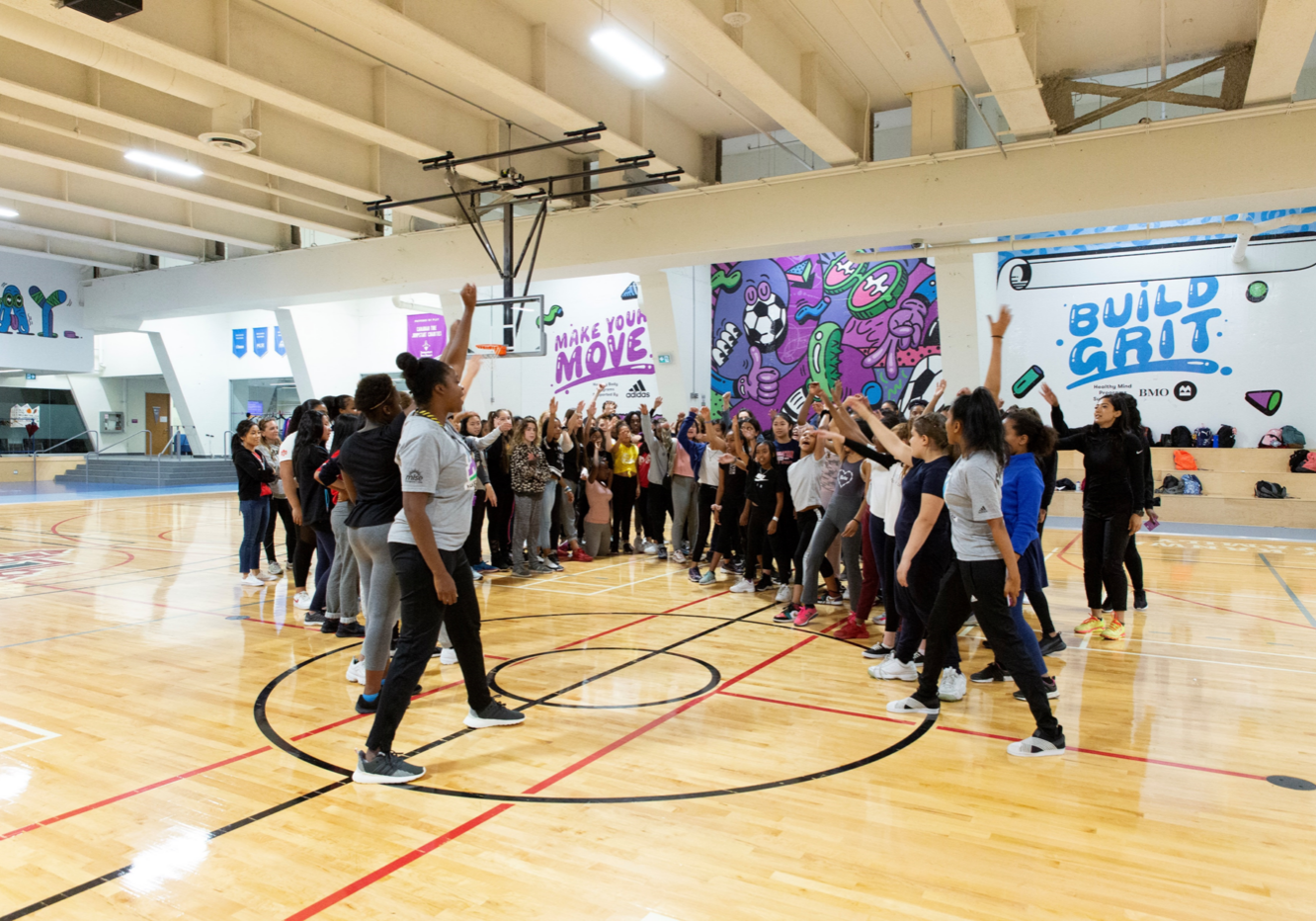
(Em)Power Her event at MLSE LaunchPad on World Mental Health Day, Oct. 10, 2019.
📸: MLSE LaunchPad website.
'IT'S ALL CONDOS'
Standing at 42,000 square feet, space is plentiful at the MLSE LaunchPad.
Located on Jarvis Street near Dundas Street East, the facility caters to local “youth facing barriers,” namely aspiring athletes who don’t have the money to enrol in development programs since playing basketball at high levels is expensive. LaunchPad, which opened in 2017, was a partnership between the MLSE Foundation, Toronto Community Housing Corporation and the City of Toronto.
In addition to providing access to a multipurpose gym, sports equipment and qualified coaching, LaunchPad has classrooms, meeting spaces and a kitchen since it also provides education on nutrition, physical fitness and life skills.
Calista Akouete, 14, is one of the beneficiaries of LaunchPad’s resources. A skilled athlete, she now plays rep basketball on elite teams, such as Canada Elite and Sisters Keeper Elite Basketball, after developing an interest in the sport during junior high school.
When she first began playing, Calista recalls getting negative comments. One time, a boy announced to the whole court, “It’s a girl. Just let her shoot.” So she did. Then her shots started getting very, very good.
A soft-spoken yet confident teen, Calista is dedicated to improving her game, so she trains regularly at LaunchPad. During the basketball season, she travels up to 90 minutes each way via GO train to the Durham Playground in Oshawa where her Canada Elite team practices.
Calista’s ultimate goal? To play in the WNBA.

Kia Nurse taught MLSE LaunchPad members new skills and drills during a basketball clinic at Toronto Metropolitan University's Mattamy Athletic centre on March 9, 2019.

Pick-up games and open gym time at LaunchPad are necessary for the youth participants to hone their skills. But space is a huge issue in Toronto, especially downtown. “It’s all condos and everything!” Calista says.
In a city like Toronto, street courts are not a viable option for six months of the year. Meanwhile, private trainers are expensive, and elite programs and teams cost thousands of dollars. If there are few low-cost gyms and other spaces for youth to use, basketball becomes limited to the privileged few. LaunchPad is just one facility in the entire city, and requires $2.5 million for its yearly operating budget. For local kids, it’s an essential space. But for other youth — especially girls — who live further afield, where can they go? And will they be welcome?
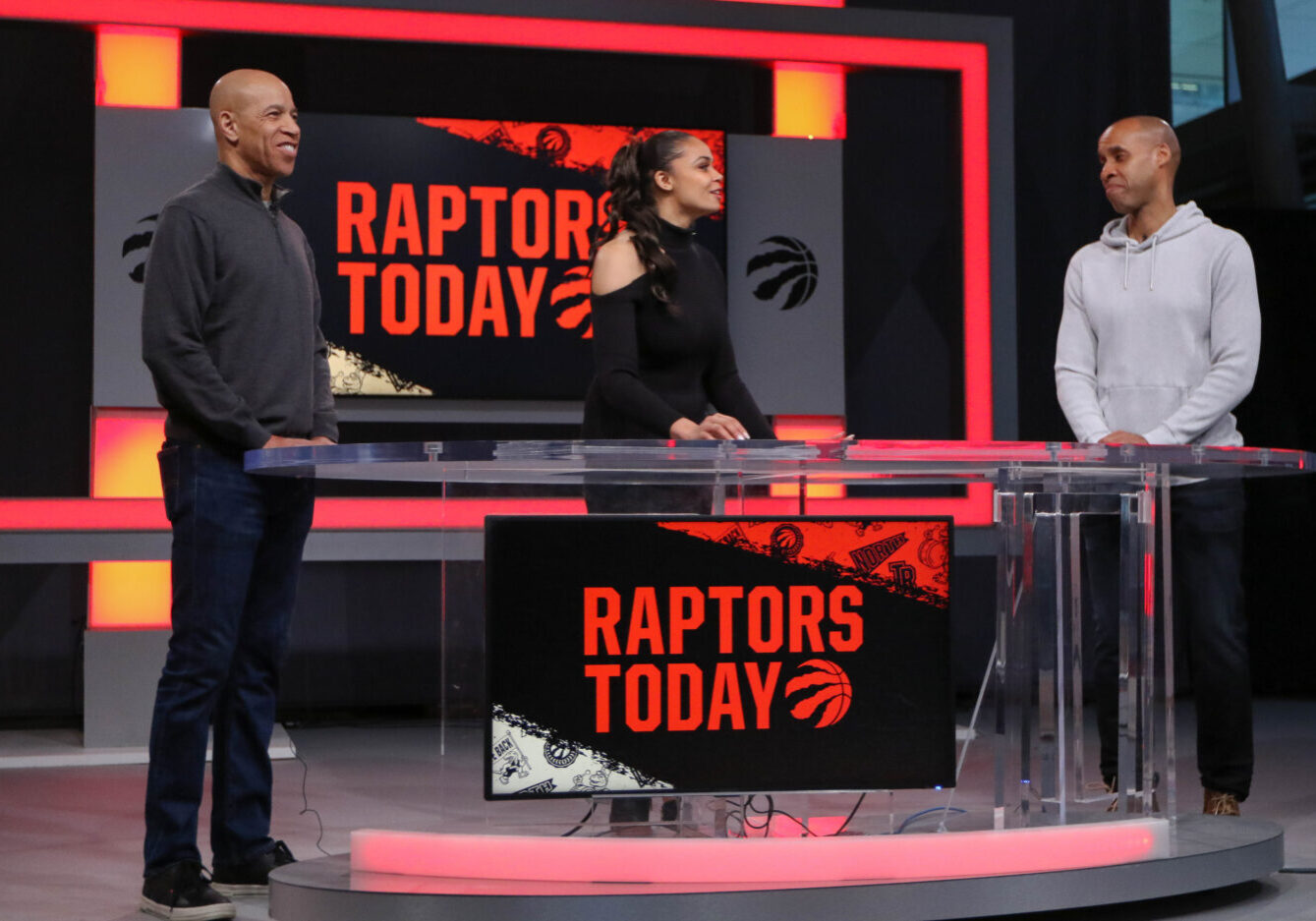
Savanna (centre) chats with fellow panelists and NBA personalities, Paul Jones (left) and Sherman Hamilton (right) on Raptors Today.

BEYOND THE COURT
Beyond contributing to Toronto’s basketball culture on the court, women are also mainstays in sports media.
Oftentimes, their roles cross over from player to analyst or sideline reporter.
On March 24, 2021, TSN aired the first-ever all-women NBA broadcast during a Raptors game against the Denver Nuggets. SportsCentre’s Kate Beirness and Raptors 905’s Amy Audibert did in-studio hosting and commentary. The rest of the team was made up of three Black women: Meghan McPeak did the play-by-play; SportsCentre anchor Kayla Grey did the sideline reporting; and WNBA player and TSN contributor Kia Nurse did the technical analysis.
Nurse, a Hamilton native, is arguably one of Canada’s most famous basketball faces. She’s currently the point guard for the Phoenix Mercury and previously played for the University of Connecticut Huskies under coach Geno Auriemma, the most storied women’s basketball program in the National Collegiate Athletic Association (NCAA).
In addition to juggling her WNBA career and sportscasting, Nurse founded Kia Nurse Elite, a basketball academy and Amateur Athletic Union (AAU) program that plays on the Elite Youth Basketball League (EYBL) circuit. It aims to elevate talented, young women players for recruitment opportunities.
“A lot of what I do is make sure they have the best coaches and staff, including the provincial and national levels,” she explains. “It’s not about getting them to the professional levels….it’s more about making sure they have every opportunity to knock on doors, talk to people, communicate, learn about life.”
“It gives them different chances that I didn’t have.”
The rising profiles of Nurse, Grey and other top female sportscasters have been a source of inspiration for many local young women who want to work in basketball. One of those women is Savanna Hamilton, 26, a host and producer at MLSE, who produced the promo ad for the historic March 24, 2021 broadcast. She’s also a reporter for Raptors 905 and anchors the Raptors Today show, making her the first Black woman host on NBA TV Canada.
“Women like Kayla really open doors for other people to see Black women in this space, which is not an uncommon thing in the States,” Hamilton says. “Many times, I am still the only Black [woman] in the room. And that’s why Kayla is opening doors with just her presence — just her presence!”
Although Hamilton had a successful basketball career at St. Edmund Campion Secondary School in Brampton — even attracting American scouts — she was drawn to media studies and storytelling. During high school, watching women like Sage Steele and LaChina Robinson report on the sidelines at NBA games inspired her to pursue a career in sportscasting.
In 2014, Hamilton eventually enrolled in the sport media program at Toronto Metropolitan University (formerly Ryerson University), and also joined the Rams women’s basketball team. A string of “crappy injuries” after her first year benched Hamilton, but helped her game-analysis skills since “you see the game in a different way.” Then a chance meeting with the late Canadian-born ESPN sportscaster John Saunders led to a job-shadowing opportunity with him that kick-started Hamilton’s career.
“We're seeing a lot more Black [women] voices in these spaces that we wouldn’t have seen this much in the past,” she says. “When I was going through school, there was no Kayla Grey on TV. And I personally found it really hard for my classmates to give me an opportunity to be on air because, well, they had never seen a Black woman on air. And even though I was vouching for myself, they went with people they were familiar with [white men].”
After Grey, Hamilton is the second Black woman in Canada to work on air full-time in Canadian sports media. Hamilton credits her ambition and competitive nature as an athlete with helping her create career opportunities in an industry that she says doesn’t often give chances to people who look like her. Women of colour aren’t her industry’s decision-makers, so that’s reflected in basketball spaces, Hamilton adds.
“There is a crab-in-a-barrel mentality,” she explains, the frustration clear in her voice. “There was a woman on the rise — a racialized woman on the rise, and someone said, ‘Oh Savanna, watch out!’ And I was like, ‘Why would I have to watch out? Did you say that to any of the 15 white people on air? There is plenty of room for both of us.’”
“I am my own worst critic, but I have learned you have to be your own cheerleader.”
SHOOT YOUR SHOT
Zeenat Saeedi, the Pakistani auntie and diehard basketball fan who watched the Raptors play the Nets at a wedding event in 2014, laughs heartily when I remind her of that time.
But she wasn’t always a fan. It took someone in Saeedi’s community to convert her.
“It was Huma,” she says. Saeedi started watching basketball when her eldest daughter Huma was in high school.
“She was into hockey, baseball and basketball,” the mom of three explains. “We didn’t go to the arena because we didn’t have that much money, but we could watch on TV.”
Saeedi moved to Canada in the early 1980s, and as her daughters and son started to gravitate towards sports, she did, too. Eventually, she became an ardent supporter of the Raptors, following the team closely over the last two decades.
Saeedi only began attending sporting events in person after her children had grown up. Now, it’s an annual family tradition to go to a Raptors or Blue Jays game. But her current love of sports comes with some regret. When Saeedi’s daughters were younger, they didn’t play on any teams; so, looking back, she feels bad that she didn’t enrol them in basketball and baseball like she did with her son Ahmad.
“In Pakistan, we had field hockey and cricket, and we watched. But 50 years ago in Pakistan, there was no concept of a girl's team,” she explains. “I had no idea as an immigrant that girls play, too. I think about that. Why didn’t I put them in the mixed teams?”
“I feel bad that I deprived them.”
Now a grandmother, Saeedi says she’d cheer on her granddaughters if they ever decide to play or watch basketball — but not if they’re Miami Heat fans. “I hated LeBron James when he was at Miami! It was because of him we couldn’t advance!” she says.
Even when they’re unwelcome, women like her who help hold up Toronto’s basketball ecosystem — the fans, players, coaches and media personalities — seek and create spaces to thrive. Today, Saeedi says she feels like she belongs in Toronto’s basketball culture, as she’s never had to explain her fandom at Scotiabank Arena or anywhere else.
Here's your chance to support the only independent, hyperlocal news outlet dedicated to serving gen Zs, millennials and other underserved communities in Toronto. Donate now to support The Green Line.
PART 3
5X5 BASKETBALL COMPETITION &
story circle on creating space for women in sports
A community event and Story Circle hosted by The Green Line.
About the Event
The Green Line will be co-hosting a community event focused on women and girls in Toronto's basketball scene with BCG East Scarborough (formerly known as the Boys and Girls Club of East Scarborough). At the event, we'll be holding a 5x5 basketball competition, so be sure to sign up your team. We'll also be hosting a Story Circle, where community members will come together to discuss barriers to local women athletes and explore possible solutions. RSVP now for our in-person event.
Events are an essential part of our Action Journey. We want to empower Torontonians to take action on the issues they learn about in The Green Line — so what better way to do that than by bringing people together? From community members to industry leaders, anyone in Toronto who’s invested in discussing and solving the problems explored in our features is invited to attend. All ages are welcome unless otherwise indicated. Our only guidelines? Be present. Listen. Be kind and courteous. Respect everyone’s privacy. Hate speech and bullying are absolutely not tolerated. At the end of the day, if you had fun and feel inspired after our events, then The Green Line team will have accomplished what we set out to do. Any questions? Contact Us.
PART 4
ON AND OFF THE COURT: IMPROVING ACCESS TO ATHLETIC SPACES
Event Overview
See what you missed
from our latest event.
Our community members brainstormed ways to create both physical and cultural space in Toronto's basketball scene for women and girls. Compiled by Julia Lawrence.
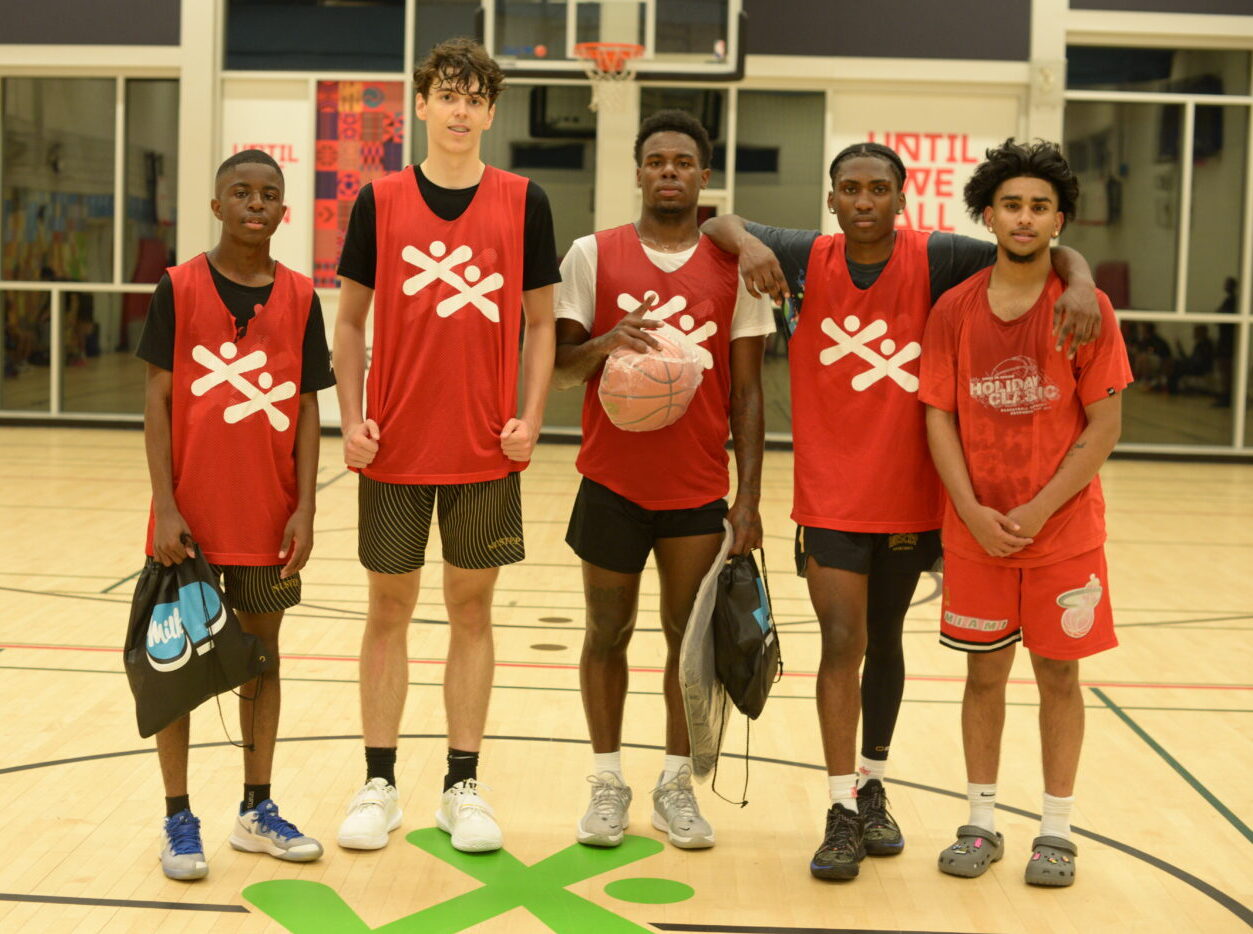
TEAM 2 WINS THE 5X5 BASKETBALL TOURNAMENT, WHICH WAS PART OF OUR AUGUST ACTION JOURNEY EVENT.
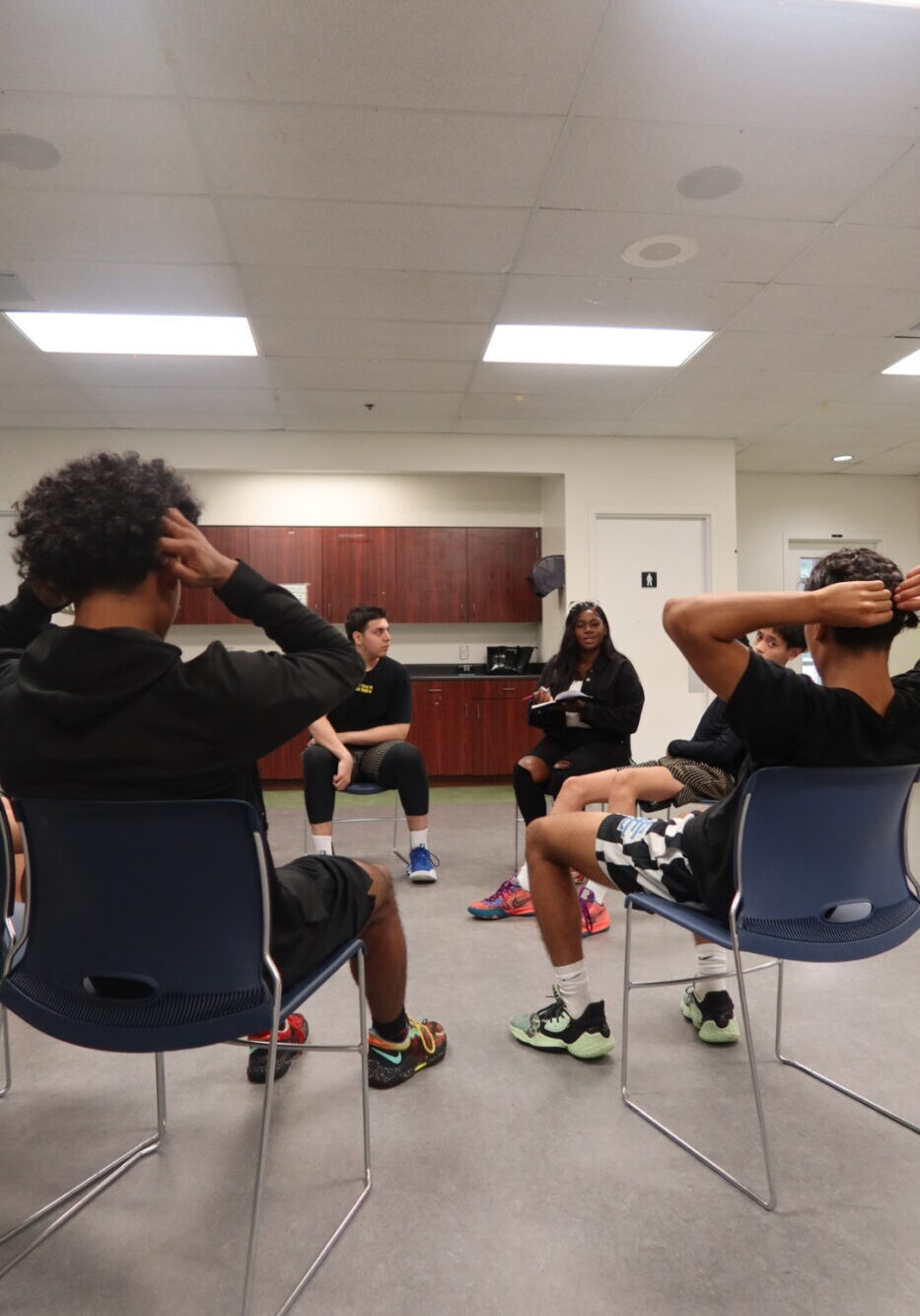
THE GREEN LINE REPORTER DUPE BADEJO MODERATES ONE OF THE BREAKOUT STORY CIRCLES AS PART OF OUR AUGUST ACTION JOURNEY EVENT.
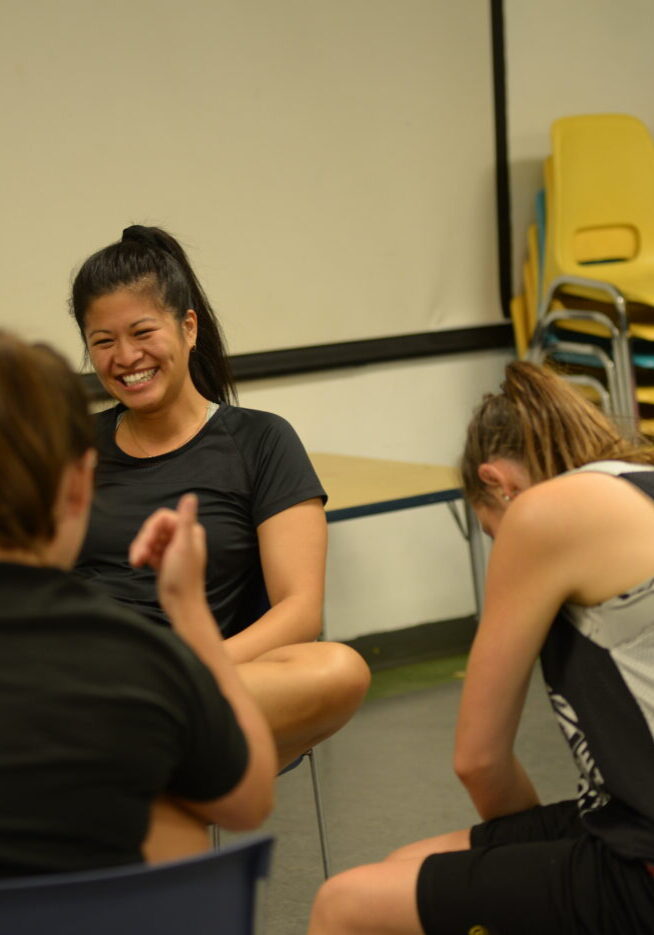
ELYSE CATER (FACING CAMERA) AND HER TEAM CHATTING AND SHARING THEIR PERSONAL EXPERIENCES AT THE STORY CIRCLE.
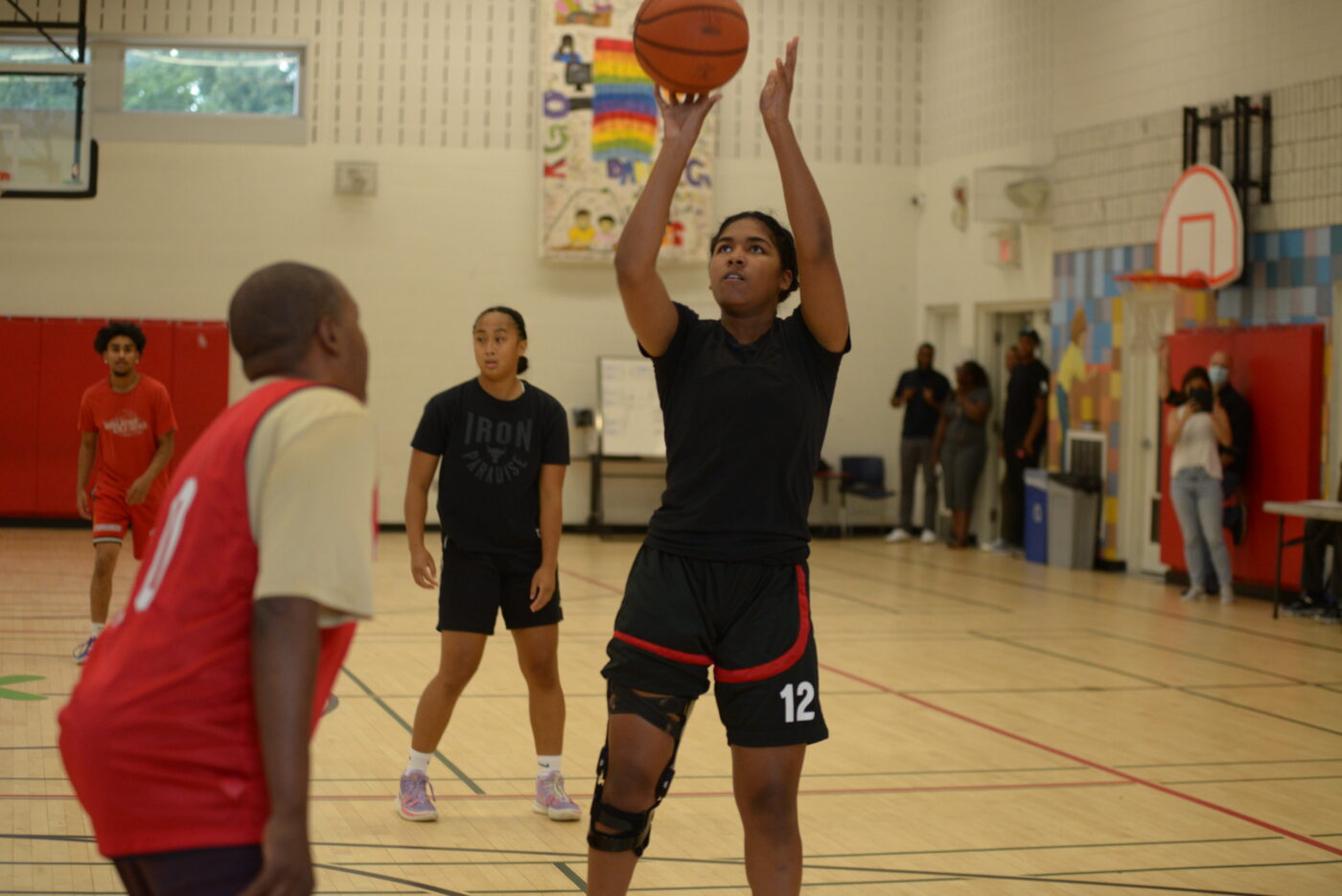
TEAM 4'S JIHANA ELLIN GUZMAN SHOOTING FOR THE BASKET.
SOLUTIONS
ACTIONS
Do something about the problems that
impact you and your communities.
Create
Your Own Team
Build a community of like-minded players by joining registered or drop-in programs in your neighbourhood.
Volunteer and
Donate Resources
Find a recreation centre in your neighbourhood where you can volunteer your time or if you're able, donate money and equipment.
Support
Game-Changing Groups
Amplify or join organizations that you think are changing the way girls and women play sports in Toronto. For example, Network of Women (NOW) Basketball is a non-profit that provides training and drop-in spaces. It also aims to create an inclusive and accessible environment for women basketball players.
Join Our
Community
Continue the conversation with other Green Line community members.

COMPETITORS AND ATTENDEES AT OUR AUGUST ACTION JOURNEY EVENT.
Supporting The Green Line means supporting Toronto. Join our membership program today, so you can redefine our city as you see it.

